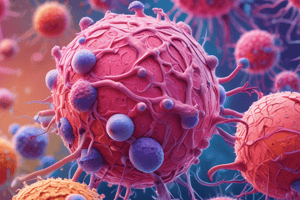Podcast
Questions and Answers
What is the primary function of the spleen?
What is the primary function of the spleen?
- Regulates red blood cell flow and fate (correct)
- Produces bile
- Filters lymph fluid
- Regulates insulin production
Which cells are primarily found in the marginal zone (MZ) of the spleen?
Which cells are primarily found in the marginal zone (MZ) of the spleen?
- CD4⁺ T cells and plasma cells
- Unique dendritic cells, macrophages, and MZ B cells (correct)
- Neutrophils and erythrocytes
- Natural killer cells and monocytes
What occurs to naïve B cells in the presence of antigens in the spleen?
What occurs to naïve B cells in the presence of antigens in the spleen?
- They migrate to the thymus
- They become macrophages
- They undergo apoptosis
- They encounter antigens and become activated (correct)
What do germinal center B cells primarily evolve into?
What do germinal center B cells primarily evolve into?
What role do activated CD4⁺ T cells play in the immune response?
What role do activated CD4⁺ T cells play in the immune response?
Flashcards are hidden until you start studying
Study Notes
Secondary Lymphoid Tissues
- Comprise essential immune organs that facilitate immune responses and maintenance of immune cells.
- Include the spleen, lymph nodes, and various associated lymphoid tissues.
Spleen
- Regulates red blood cell circulation and manages their fate within the body.
- Contains germinal centers that develop in response to immune activity, similar to lymph nodes.
- The marginal zone (MZ) serves as a boundary between the blood and the spleen's white pulp, filled with specialized immune cells.
- MZ plays a vital role in trapping blood-borne pathogens, housing unique dendritic cells, macrophages, and marginal zone B cells.
- Naïve B and T cells stationed in the spleen encounter antigens, leading to their activation.
- Activated CD4⁺ T cells provide assistance to B cells and CD8⁺ T cells, prompting migration back to follicles to form germinal centers.
- Germinal center B cells can differentiate into memory or plasma cells and are capable of relocating to various tissues, including the bone marrow.
Other Secondary Lymphoid Tissues
- Lymph Nodes: Integral for filtering lymphatic fluid and serving as sites for immune cell activation.
- Mucus Associated Lymphoid Tissue (MALT): Includes lymph nodes, tonsils, and adenoids, involved in mucosal immunity.
- Gut Associated Lymphoid Tissue (GALT): Comprises Peyer's patches, mesenteric lymph nodes, and the appendix, essential for gut immunity.
- Skin Associated Lymphoid Tissue (SALT): Contributes to skin immune defense.
- Bronchus Associated Lymphoid Tissue (BALT): Focuses on respiratory tract immunity.
Studying That Suits You
Use AI to generate personalized quizzes and flashcards to suit your learning preferences.




